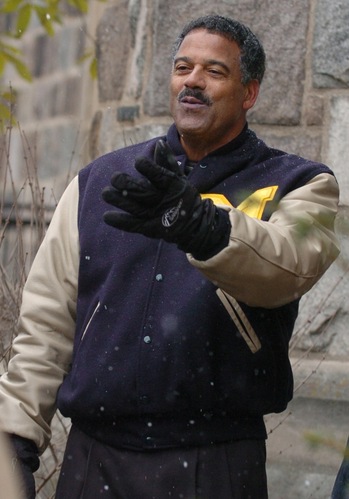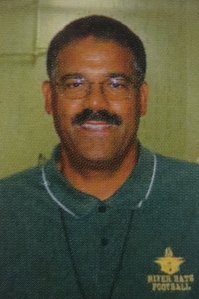The idea that "boys will be boys" didn't fly in William Harris' gym class.

Haisley Elementary School
From AAPS
But when the students arrived at the gym at Haisley Elementary School in Ann Arbor the following day, their punishment had changed.
Harris had placed three chairs in a dimly lit, windowless room behind the gym teacher's office. Harris herded the fifth-graders into the room and shut the door. Depending on whom you believe, he may or may not have put a chair in front of the door. He also shut the door to his office, resulting in two doors separating him from the boys.

Former University of Michigan football player William "Billy" Harris waits outside St. Andrew's Episcopal Church in Ann Arbor to pay his respects to former U-M coach Glenn "Bo" Edward Schembechler at a public tribute Sunday, Nov. 19, 2006. Harris was employed as a physical education teacher in the Ann Arbor Public Schools at the time.
Ann Arbor News file photo
Ultimately, Harris' decision to shut the boys in the room led the Ann Arbor Public Schools to fire him, and after more than three years of investigations and tenure hearings, multiple courts now have ruled the district was justified in dismissing him, though Harris said he did nothing wrong.
History of problems
The day in October 2009 when Harris shut the boys in the closet was not the first time he had run afoul of district policy.
William "Billy" Jerome Harris came to Haisley Elementary for the 2008-09 school year after running into trouble while working as a coach at Huron High School.
The district hired Harris prior to the 2003-04 academic year to serve as head football coach and physical education teacher at Huron. Court documents show Harris had a history of disciplinary problems while employed at the Ann Arbor Public Schools — including the alleged assault and battery of a student, which resulted in criminal charges in November 2004.
Harris went to jury trial on the charges and was found not guilty, said officials with the Washtenaw County Prosecutor's Office.
The details of the alleged assault and battery are not known. Officials with the prosecutor's office said the file on the case has been purged. AAPS spokeswoman Liz Margolis declined to comment for this story. Neither Harris nor his lawyer returned phone calls seeking comment.
Although Harris was acquitted of the criminal charges, the district suspended him for three days without pay in April 2007 for his misconduct in the 2004 incident, according to court documents.
Harris' coaching contract was not renewed after the 2004-05 school year and his physical education teaching assignment was changed to Pioneer High School for 2006-07. Harris, who was a former University of Michigan football player and coach at U-M and Eastern Michigan University, was transferred to Haisley Elementary School in 2008-09. He had never taught elementary physical education before.
'Disturbed' and 'Furious'
When the school day ended on Oct. 8, 2009, one of the boys Harris had shut in the small room went home and told his mother. She was immediately "disturbed" and complained to both Haisley Principal Mary Ann Jaeger and the superintendent. When the father of another boy found out what happened, he was "furious," and the investigation into Harris' discipline methods began.
The district put Harris on administrative leave in late October. During their investigation, district officials discovered he had disciplined at least one other student in the same manner, by shutting the boy in the supply room behind his office. The first student was punished for yelling "four" on the fourth step of a dance routine that Harris was teaching the class and was exiled to the room for 10 to 20 minutes.
Harris was accused of shutting a fourth-grade student in the room as a punishment during the previous year.
Harris admitted to placing students in the "back room" or the "dark room," as he referred to it, for unsupervised confinement, but he argued there was nothing "obviously inappropriate" about it, court documents say.
The supply room is out of sight from the gym and approximately 8-by-8 feet in size with no windows and four doors, one door on each wall. There is a door between the back room and Harris' office, one between the back room and a computer lab, one between a bathroom and the back room and one between the back room and a storage closet.
There is an unlocked cabinet in the back room that houses poisonous chemicals and cleaning supplies, gym equipment and a vacuum, according to reports.
The district said Harris placed a chair in front of the door to the supply room while the students were inside. But Harris denied those allegations, court documents show.
Jaeger had previously told Harris that he had been sending students to the main office too frequently for minor infractions, such as forgetting to bring their gym shoes to class. Jaeger said Harris should handle these infractions on his own by having the child sit on the sidelines or in Harris' office, which is connected to the gym, for a timeout. But according to court documents, Jaeger said the students should remain in his view.
Tenure charges
The Ann Arbor Board of Education voted on Dec. 15, 2010, to pursue tenure charges against Harris. Harris' case went before an administrative law judge for a tenure hearing in May and June of 2011.
Three of the four students punished in the room testified, as did at least one parent of each boy, court documents show.
The first boy said he told no one about the incident because he did not believe it was a big deal and he did not want to get into more trouble. One of the students testified he was not afraid while in the back room, but rather he was angry because he thought he just would have to do push-ups and then would be allowed to rejoin the activities. The third boy said he was relieved to miss gym class.
The judge ruled Harris had been wrong to punish the students by shutting them in the room.
"Mr. Harris failed to supervise his students, the judge wrote. "The failure to supervise students results in an increased risk of harm to students."
The court documents also contain testimony from teachers, Jaeger, other students and a paraeducator. Some of those who testified said Harris picked on special needs children and singled out students who were not athletic in his class.
They said Harris made negative and inappropriate comments about special education students, calling them "mindless." The paraeducator said Harris frequently had students perform exercises in the middle of a large circle of their peers until the students did the exercises correctly. She also said Harris' created an atmosphere in which students hated coming to gym class and were fearful of him.
Paul Morrison, the former executive director of the Ann Arbor Education Association, testified in Harris' defense, stating the gym teacher was treated more harshly than other teachers who were being investigated by the human resources department at the time.
His testimony referenced a teacher accused of giving a student a wedgie, a teacher who reported that she lost 70 Vicodin pills and an art teacher who emptied a wet sponge over a student's head, court documents say. Morrison said the most severe punishment these teachers received was a single day without pay.

William "Billy" Harris was hired as a Huron football coach and gym teacher in 2003-04.
Huron yearbook photo
The judge was unimpressed.
"Mr. Harris engaged in a pattern of intentionally embarrassing and degrading students," the administrative law judge wrote. "There are numerous instances recounted where Mr. Harris humiliated students because they were unable to perform the physical activities, such as 'donkey kicks,' dribbling a basketball, jumping rope and dancing.
"Mr. Harris also made a demeaning comment regarding POHI (physically and otherwise health impaired) students. (His) conduct in this regard violates common decency. This conduct is unacceptable and so obviously inappropriate that it is unnecessary to give Mr. Harris warning or an opportunity to correct his behavior."
The State Teacher Tenure Commission, to which Harris appealed, agreed with the judge, ruling that the incidents Morrison cited could not be "reasonably characterized as the same as or substantially similar to" Harris' actions, court documents say.
Cases resolved
The same night the school board unanimously approved tenure charges against Harris, it also pursued charges against former Huron orchestra teacher Christopher Mark, who was accused of "grooming" a female student for a romantic relationship.
Mark's tenure case also recently came to a close when, in March, he — like Harris — was denied an appeal of his dismissal by the Michigan Court of Appeals. The court cited a "lack of merit on the grounds presented" as the reason both Harris and Mark were denied a hearing.
In teacher tenure cases, an administrative law judge with the Michigan Department of Education serves as the initial decision-maker, and he or she issues a preliminary order on all cases, granting or denying the district's request to discharge the tenured teacher.
It is the judge's responsibility to determine whether the school district had a reasonable and just cause for firing the teacher in question.
The teacher can then appeal to the State Teacher Tenure Commission. In Harris' case, the commission upheld the administrative law judge's ruling and the Michigan Court of Appeals decided not to hear his case, letting his firing stand.
Danielle Arndt covers K-12 education for AnnArbor.com. Follow her on Twitter @DanielleArndt or email her at daniellearndt@annarbor.com.